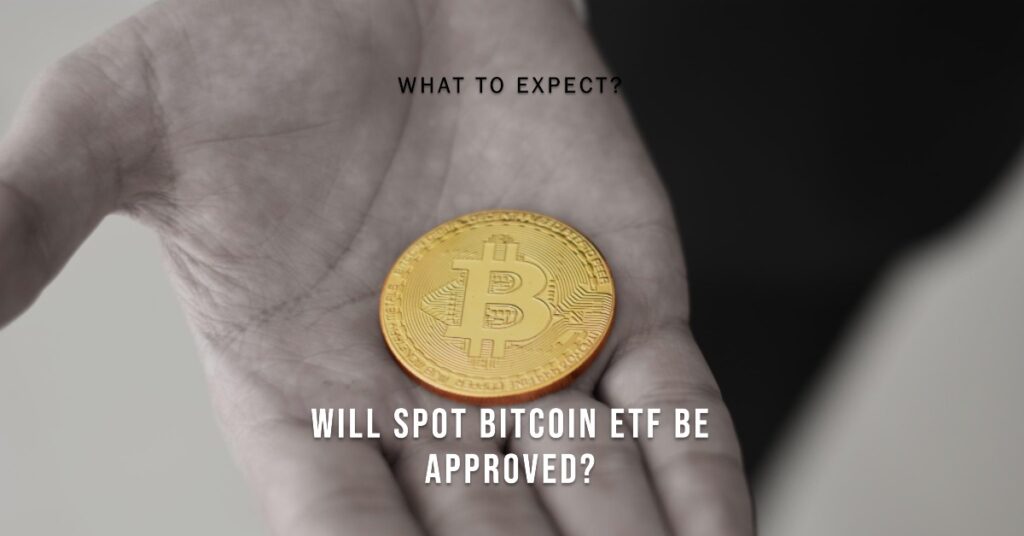Spot Bitcoin ETF Approval: What to Expect?

Cryptocurrency investors and enthusiasts are abuzz with excitement over the possibility of spot Bitcoin ETFs gaining regulatory approval. These investment vehicles, which aim to provide everyday investors with exposure to Bitcoin’s price movements, have been a subject of keen interest in the financial world. In this article, we will delve into the significance of spot Bitcoin ETFs, the hurdles they face, and what the future may hold for these innovative investment products.
Introduction
The world of cryptocurrency has seen its share of revolutions, but the potential approval of spot Bitcoin ETFs may be one of the most eagerly anticipated. These Exchange-Traded Funds(ETFs), directly linked to the world’s leading cryptocurrency, have the potential to democratize Bitcoin investment, making it more accessible to mainstream investors. The excitement surrounding the possibility of these ETFs getting the green light is palpable, and in this article, we will explore the reasons behind it.
Why You Should Care: The Significance of Spot Bitcoin ETFs
What Sets Spot Bitcoin ETFs Apart?
Spot Bitcoin ETFs are distinct from other forms of cryptocurrency investment, and that’s a key reason why they’ve garnered so much attention. Unlike their counterparts that rely on futures contracts, spot Bitcoin ETFs invest directly in the cryptocurrency itself. This direct ownership can make them more intuitive and transparent for investors. With spot Bitcoin ETFs, each share corresponds to a specific number of actual bitcoins held.
The Potential Benefits
The excitement surrounding spot Bitcoin ETFs is fueled by the potential benefits they offer. First and foremost, they lower the barriers to entry for the average investor. Managing cryptocurrency wallets, navigating online exchanges, and safeguarding private keys can be daunting tasks. Spot Bitcoin ETFs simplify asset management, making it more attractive to those accustomed to traditional investments. Additionally, these ETFs provide regulatory oversight, which can offer investors a sense of security.
Related: Simple Guide to Buy Bitcoin with Venmo Safely and Instantly Best Bitcoin Wallet for Nigeria 2023: Keeping Your Crypto Safe Sell Your Offgamers Gift Cards for Bitcoin or Cash on CoinCola Best Site to Sell Bitcoins in Ghana and Kenya in 2023
Is It Possible? Understanding the Regulatory Landscape
The Regulatory Quandary
The approval of spot Bitcoin ETFs is not a straightforward matter. The cryptocurrency market’s unique characteristics have presented challenges for regulators. Market manipulation, custody of assets, and investor protection are among the key concerns. Regulators are keen on ensuring that the potential ETFs meet the necessary standards to protect investors.
A Glimpse into the Past
The history of ETF approval attempts provides insights into the complexity of this process. Previous proposals have faced rejection, with regulators citing concerns over market manipulation and investor protection. These past decisions have set a precedent, further highlighting the need for spot Bitcoin ETFs to address these issues adequately.
The Factors at Play: Key Elements Affecting Approval
Market Manipulation
Market manipulation remains a critical concern for regulators. The highly volatile nature of the cryptocurrency market leaves it susceptible to price manipulation. Ensuring that the ETF’s underlying asset, Bitcoin, is protected from such manipulation is paramount.
Custody Solutions
Proper custody solutions are essential for safeguarding the assets held by spot Bitcoin ETFs. Regulators require robust security measures, such as cold storage, to reduce the risk of hacking. Investors need assurance that their investments are safe.
Investor Protection
Protecting investors is a primary concern. Regulators want to ensure that investors are informed about the risks associated with cryptocurrency investments. ETFs must provide clear and comprehensive information, allowing investors to make informed decisions.
Grayscale’s Court Ruling
The recent court ruling regarding Grayscale‘s spot Bitcoin ETF proposal has been closely watched. The court’s decision not to appeal this rejection has raised expectations. This could indicate a reevaluation of spot Bitcoin ETFs and provide insights into future regulatory decisions.
Can You Predict the Approval Timeline? Speculations and Insights
Expert Opinions
As we navigate the winding road to spot Bitcoin ETF approval, it’s essential to consider the insights of experts who closely follow the cryptocurrency market. In recent years, there have been promising cases where experts’ predictions have offered a glimpse into the future:
- Grayscale’s Case: The recent decision not to appeal the rejection of Grayscale’s spot Bitcoin ETF proposal has piqued interest. This case provides real-world evidence of regulatory decisions impacting the approval timeline. While Grayscale faced a setback, the case offers valuable insights into the factors that are currently influencing regulatory sentiment.
- Canada’s Success: Looking beyond the United States, we can find real cases of spot Bitcoin ETFs gaining approval. Canada’s regulatory body approved the Purpose Bitcoin ETF in early 2021, marking a significant milestone. This success story demonstrates that approval is possible, even in a complex regulatory landscape.
- Growing Industry Support: Industry players like Ark Invest and 21Shares have made significant modifications to their ETF applications. This proactive approach indicates an active dialogue between these organizations and regulators. Real cases of ongoing discussions highlight the industry’s determination to push for approval.
Emerging Trends
Apart from real cases, we must keep a keen eye on emerging trends that can shape the approval timeline:
- Evolving Regulatory Frameworks: Regulatory frameworks for cryptocurrencies are continually evolving. Real-time changes in legislation, guidelines, and standards can significantly impact the approval process. Staying informed about these developments is crucial.
- Shifting Investor Sentiment: The cryptocurrency market is not only influenced by regulatory decisions but also by investor sentiment. As more investors embrace digital assets, the pressure on regulators to accommodate these interests may grow. Monitoring these shifting sentiments is vital.
- Global Developments: The cryptocurrency market is global, and regulatory decisions in one part of the world can influence decisions elsewhere. Real cases of approval or rejection in different countries may set precedents that influence the United States’ timeline.
In this dynamic landscape, real cases and emerging trends are valuable indicators that help us navigate the uncertain path toward spot Bitcoin ETF approval.
Ways to Prepare for Spot Bitcoin ETF Approval
With the potential approval of spot Bitcoin ETFs on the horizon, preparing for this significant development in the cryptocurrency market is crucial. Here are various ways to ensure you’re ready to seize the opportunities and mitigate the risks:
1. Develop an Investment Strategy
Before diving into the world of spot Bitcoin ETFs, it’s essential to have a well-thought-out investment strategy in place. Consider factors such as your financial goals, risk tolerance, and investment horizon. Develop a diversified portfolio that aligns with your objectives, and be prepared to adjust your strategy as the market evolves.
2. Stay Informed
The cryptocurrency market is known for its rapid changes. To make informed decisions, stay updated on the latest news, regulatory updates, and market trends. Follow reputable cryptocurrency news sources and engage with online communities to gain insights and stay ahead of market developments.
3. Consider Diversification
Diversification is a fundamental risk management strategy. While spot Bitcoin ETFs offer direct exposure to Bitcoin, consider diversifying your investment across different asset classes. This approach can help mitigate risk and reduce the impact of market volatility on your overall portfolio.
4. Risk Management
Cryptocurrency investments are inherently volatile. As the ETF approval may attract more investors, be prepared for potential price fluctuations. Set clear risk management parameters, including stop-loss orders and position sizing, to protect your capital.
5. Understand Tax Implications
The tax treatment of investments in spot Bitcoin ETFs can vary depending on your jurisdiction. Consult with a tax professional to understand the tax implications of your investments and ensure compliance with local regulations. Being aware of tax considerations can help you maximize your returns.
6. Evaluate Brokerage Platforms
As spot Bitcoin ETFs gain approval, it’s crucial to evaluate and choose a reliable brokerage platform to execute your trades. Look for platforms that offer secure and user-friendly services, competitive fees, and a track record of trustworthiness.
7. Regulatory Compliance
Ensure that you adhere to the regulatory guidelines in your region. Familiarize yourself with the legal requirements and compliance measures related to cryptocurrency investments. Staying on the right side of the law is essential for a smooth investment experience.
8. Plan for Long-Term Success
While the allure of short-term gains is appealing, consider adopting a long-term perspective. Cryptocurrency investments, including spot Bitcoin ETFs, can be more rewarding when approached with a patient and long-term mindset. Be prepared to weather market fluctuations and remain committed to your investment goals.
9. Seek Professional Guidance
If you’re new to cryptocurrency investments or feel unsure about your strategy, consider seeking guidance from financial advisors or cryptocurrency experts. Their insights can provide valuable perspectives and help you make well-informed decisions.
10. Monitor Regulatory Updates
Regulatory changes can significantly impact the cryptocurrency market. Stay vigilant about evolving regulations and their potential effects on spot Bitcoin ETFs. As the regulatory landscape evolves, adapt your strategy to remain compliant and maximize opportunities.
The potential approval of spot Bitcoin ETFs is a promising development, but it also comes with challenges and uncertainties. By preparing thoughtfully and staying informed, you can position yourself for success in the evolving cryptocurrency investment landscape. Remember that while these steps can help you prepare, there’s no substitute for careful research and continuous learning as you navigate the dynamic world of cryptocurrency investments.
Conclusion
In summary, the potential approval of spot Bitcoin ETFs represents a significant development in the cryptocurrency market. While the road to approval is not without challenges, the benefits they offer in terms of accessibility and regulatory oversight make them a promising investment vehicle. Staying informed and prepared for this potential approval is crucial for those interested in cryptocurrency investment.
CoinCola offers a secure platform for cryptocurrency trading, including the ability to sell gift cards to Bitcoins. Explore our services and start your cryptocurrency journey today.
FAQs
A spot Bitcoin ETF is an investment vehicle that directly holds Bitcoin as its underlying asset, allowing investors to gain exposure to Bitcoin’s price movements.
Spot Bitcoin ETFs offer accessibility and regulatory oversight, making them attractive to mainstream investors looking to invest in cryptocurrencies.
Regulators are concerned about market manipulation, custody solutions, and investor protection. These issues must be addressed to gain approval.
Expert opinions and industry modifications to ETF applications suggest that approval could be on the horizon, with 2024 being a notable year to watch.
Investors should develop investment strategies, stay informed about regulatory updates, and consider diversification to mitigate risks.




